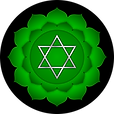
Human Energy Fields
Human energy fields and chakras are concepts rooted in various spiritual and alternative healing traditions, particularly within systems like Hinduism, Buddhism, and New Age spirituality. These ideas suggest that there is more to human existence than just the physical body, and they attempt to explain the interconnectedness of physical, mental, emotional, and spiritual aspects of a person.
The concept of human energy fields refers to the idea that there is an energetic aspect to our being beyond the physical body. This energy is believed to flow through and around our body, influencing our health and well-being. Different cultures and belief systems have different names for this energy, such as "qi" or "chi" in Chinese traditions, "prana" in Hinduism, and "life force energy" in New Age spirituality.

The purpose of working with chakras is often to balance and align these energy centers, which is believed to promote holistic well-being—physically, mentally, emotionally, and spiritually. Practices like meditation, visualization, breathwork, and yoga are often used to clear blockages and stimulate the flow of energy within the chakras.
Chakras
Chakras are specific energy centers within the human energy field. The term "chakra" comes from Sanskrit and means "wheel" or "disk." These energy centers are believed to be located along the spine, from the base to the crown of the head. Each chakra is thought to correspond to specific physical, emotional, and spiritual functions. There are usually seven main chakras, each associated with different qualities. Each is listed below.

Root Chakra
Root Chakra (Muladhara): Located at the base of the spine, it's associated with feelings of stability, security, and survival.
Too Open
Susceptible to harassment, excessively focused on material possessions, self-absorbed, and prone to engaging in imprudent physical actions.
Balanced
Exhibits self-control and discipline, possesses abundant physical vitality, maintains a strong connection with reality, and enjoys good health.
Too Closed
Experiencing emotional dependency, struggling with self-worth issues, engaging in self-destructive actions, and often gripped by fear.
Cedarwood
Patchouli
Myrrh

Musk
Lavender
Red Jasper
Tiger Eye

Garnet

Onyx

Black Obsidian
Smoky Quartz
Hematite

Solar Plexus Chakra
Solar Plexus Chakra (Manipura): Located in the upper abdomen, it's associated with personal power, confidence, and self-esteem.
Too Open
Experiencing emotional instability, prone to fantasizing, struggling with sexual addiction, and displaying manipulative tendencies.
Balanced
Open to trust, freely expressive, endowed with creativity, and deeply in tune with their own emotions.
Too Closed
Highly sensitive, self-critical, prone to unfounded guilt, and experiencing challenges with sexual responsiveness.
Jasmine
Rose
Yling Yling
Sandalwood
Tangerine
Patchouli
Citrine

Carnelian

Golden Topaz
Orange Calcite
Sunstone

Sacral Chakra
Sacral Chakra (Svadhishthana): Found in the lower abdomen, it's connected to emotions, creativity, and sexuality.
Too Open
Exhibiting anger, a need for control, a sense of superiority, a tendency to overwork, and a judgmental attitude.
Balanced
Demonstrating self-respect and respect for others, possessing personal empowerment, embracing spontaneity, and displaying a lack of inhibition.
Too Closed
Excessively preoccupied with external opinions, anxious about solitude, marked by insecurity, and seeking continual validation.
Rosemary
Myrrh
Yling Yling
Sandalwood
Cedarwood

Spearmint
Citrine

Pyrite

Golden Topaz
Aventurine
Sunstone

Heart Chakra
Heart Chakra (Anahata): Situated in the chest, it's linked to love, compassion, and relationships.
Too Open
Exhibiting possessiveness, offering love conditionally, using emotional withholding as a means of punishment, and displaying excessive drama.
Balanced
Demonstrates compassion, loves without conditions, nurtures, and seeks spiritual connection in intimate relationships.
Too Closed
Afraid of rejection, loves too much, struggles with feelings of unworthiness to accept love, and frequently experiences self-pity.
Rose

Lemon Balm
Bergamont
Eucalyptus
Yling Yling
Frankincense
Pine

Watermelon Tormaline
Rose Quartz

Emerald
Jade

Green Calcite

Malachite
Aventurine

Throat Chakra
Throat Chakra (Vishuddha): Found in the throat, it's related to communication, self-expression, and truth.
Too Open
Excessively chatty, firmly opinionated, self-assured in their beliefs, and displaying arrogance.
Balanced
Effective communication skills, a strong sense of connection, inspired by artistic pursuits, and experiences ease in meditation.
Too Closed
Tends to withhold self-expression, demonstrates unreliability, and exhibits inconsistent viewpoints.
Chamomile
Peppermint
Bergamont
Basil
Ginger

Turquoise
Lapis Lazuli

Aquamarine
Sodalite

Sapphire
Amazonite

Blue Lace Agate

Third Eye Chakra
Third Eye Chakra (Ajna): Located between the eyebrows, it's connected to intuition, insight, and spiritual awareness.
Too Open
Highly rational, firmly opinionated, inclined toward authoritarianism, and displaying arrogance.
Balanced
Exuding charisma, possessing strong intuition, unattached to material possessions, and possibly encountering supernatural experiences.
Too Closed
Lacking discipline, harboring a fear of success, inclined toward tendencies associated with schizophrenia, and often setting modest goals.
Violet
Yling Yling
Clary Sage
Lavender

Elemi
Frankincense
Patchouli
Amethyst

Azurite

Purple Apatite

Blue Calcite
Lapis Lazuli
Fluorite
Clear Quartz

Crown Chakra
Crown Chakra (Sahasrara): At the top of the head, it represents spiritual connection, higher consciousness, and enlightenment.
Too Open
Feeling distant from one's surroundings, experiencing detachment from the physical body, displaying feelings of superiority, and exhibiting elitist attitudes.
Balanced
Strong self-awareness, a clear sense of purpose, a profound connection to the world, and an enduring sense of joy, peace, and serenity.
Too Closed
Difficulty in maintaining focus, experiencing depression, feeling a lack of direction or purpose, struggling with confusion, and displaying indecisiveness.
Lemon
White Lotus
Geranium
Lavender

Elemi
Cedarwood
Jasmine
Amethyst
Celestite
Selenite

Lodolite
Lapis Lazuli
Labradorite
Clear Quartz
Auras
An aura refers to the subtle energy field that surrounds and interpenetrates our physical body. It is often described as an electromagnetic field that extends a few inches to a few feet from the body, encompassing our physical, mental, emotional, and spiritual aspects. According to many belief systems, the aura is connected to our overall well-being and can reflect our physical and emotional states.
The aura is believed to consist of different layers or levels, often referred to as the biofield or subtle bodies. These layers are associated with various aspects of our being, such as the physical, emotional, mental, and spiritual. They are said to contain information about our energy, emotions, thoughts, and overall health.
The colors of an aura are believed to represent different qualities or states of being. Each color is associated with specific emotions, personality traits, and energetic vibrations. For instance, blue may represent calmness and communication, while red can indicate vitality and passion.
The body's energy field, on the other hand, is often considered as the overall energetic system which encompasses the aura and the flow of energy through the body. This energy is referred to as life force, chi, prana, or simply, energy. The body's energy field is believed to consist of channels or pathways, often known as meridians in some traditional practices like acupuncture or nadis in yoga. These pathways are said to facilitate the flow of energy throughout the body, maintaining our health and well-being.













































